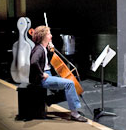The Voice, by Thomas Quasthoff
 Editor's Abstract
Editor's Abstract
Since I do lot of teaching I read a lot of books. Not all of them are music-related, but a high proportion of them are. From time to time in this space I’ll be posting reviews of books I’ve read, with the hope that 1) you’ll be able to sort through books more quickly (as to whether you really want to spend the time reading them) and 2) you’ll read something that you might not have otherwise considered. Enjoy!
Yvonne Caruthers
Everyone knows that the music profession is a difficult one to succeed in. There is always someone who can play louder, softer, higher, lower, faster, or slower than you can. There are auditions for everything—all-state band, regional festivals, solo competitions, summer camps, music schools, jobs—-competition is ever-present. That’s true for healthy, normal children who grow up to become healthy, normal adults.
Thomas Quasthoff, the German bass baritone, never enjoyed the luxury of being a healthy, normal child. His mother took thalidomide when she was pregnant with him, and her son was born with severe deformities. (5000 babies in West Germany alone died as a result of their mothers taking this drug). Quasthoff describes the results of taking thalidomide: “taken between the twenty fourth and twenty ninth days [of pregnancy]…. the long bones of arms and legs develop incompletely and the hands and feet grow attached directly at the shoulder and hip, something like fins”. For several years it was thought that he’d never be able to walk, let alone live independently.
But “The Voice” of Thomas Quasthoff, a splendid bass baritone voice, has allowed him a very different life than was originally predicted for him. In his own words, “No one expects such a mighty voice to issue from my diminutive frame.” Today he’s known as one of the best Schubertian lieder singers in the world, but he also performs (and records) Bach, Mahler, Wagner, Mendelssohn, and Haydn, as well as selections from the Great American Songbook. This book is a memoir of Quasthoff’s struggles to overcome not only physical limitations, but blatant prejudice, and to succeed in ways that most musicians only dream about.
Luckily Quasthoff was born into a supportive family. This book was “recorded by Michael Quasthoff”, the singer’s brother. The two of them were close as children and have remained so as adults. Likewise the singer’s parents appear often in these pages, sometimes to protect him, other times to spur him on. He tells us of his mother’s intense guilt and his father’s determination to help his son walk, but neither parent seems to have overly protected him or instilled in him a sense of entitlement.
Some anecdotes he shares with us are literally hair-raising. Imagine being a valued member of your high school’s choir and learning (on your own) that the choir is going on tour without you. No one told you—not your “friends”, not the director, no one. He chose law as a “back-up” profession. At the university he asked one of his roommates to retrieve a book from a high shelf for him and the student replied: “You can see that I’m working!” When he won his first Grammy, a colleague hissed at him “You owe this victory to your disability, nothing else”.
So the reader rejoices when Quasthoff enjoys a huge success in Parsifal, or at the Oregon Bach Festival, and you enjoy his happier anecdotes about various performers he’s worked with, such as Yuri Bashmet, Anne Sofie von Otter, and Helmuth Rilling. Never a snob, Quasthoff devotes approximately as much space in the book to his non-classical music-making (with rock and jazz bands, and experimental theater groups) as to his more rarefied concert appearances, and the “coda” of the book is a heart-warming tribute to his wife and daughter.
There have been repeated attempts to enlist Quasthoff as a spokesman for other “disabled” people (he resents the label but doesn’t offer us a better alternative). He says his current response to such attempts is “I am one of eighty million disabled Germans—I just happen to be more visible”.
The perfect read for any musician who needs a jolt of inspiration.

Leave a Comment: